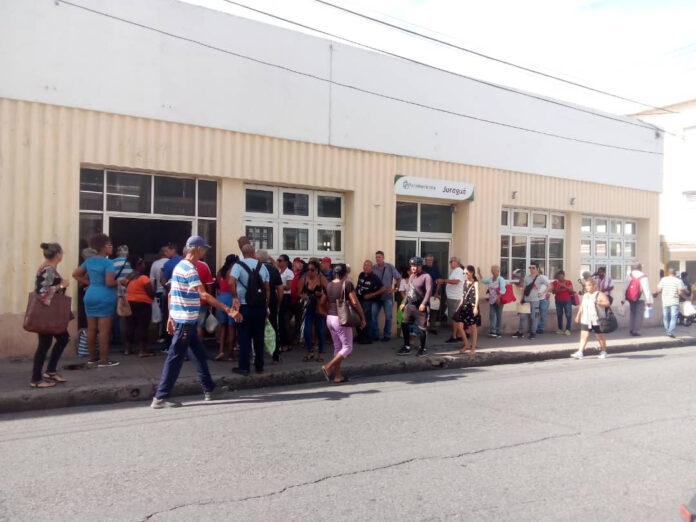
Workers flee in search of food and state-owned businesses and offices are sometimes left unattended during the day.
By Julio Cesar Contreras (14ymedio)
HAVANA TIMES – Surviving in Cuba is a matter of strategy, money and a lot of time to dedicate to hunting for food and basic necessities. Cienfuegos is no exception. And, if at noon there is nothing left to buy in the shops, the normal thing is that during working hours, especially in the mornings, workers run out in search of food, and State companies are left without a soul.
The counterpart of empty institutions are the crowded lines that form in the portals of stores and premises of all kinds. Bakeries, ATMs and agricultural markets have the longest ones.
“The only thing I’ve done at work today is sign the entry card. I left thinking I would solve things quickly, and here I am, waiting to see if I can pick up the bank card I ordered three months ago,” says Tamara, irritated. Although she is at the branch of the Banco Popular de Ahorro, on San Carlos Street, she already has her eye on another line at the La Princesa market to buy cookies for her children’s school snacks. “It’s impossible to do two things at the same time, and when it comes to choosing, I give priority to mine,” she says.

The lines do not originate just from the demand for sought-after products. It also results from the slowness of the salesclerks and officials, who take “all the time in the world” to attend to people. According to Tamara, excessive delays to serve the public are a common denominator, and it’s the same at the box office of the Terry Theater, on the waiting list of the bus terminal, or in the pizzeria of El Prado. “The place may vary. What does not change, in any case, is the terrible customer service.”
Standing in line in the city begins long before eight in the morning. Juan Carlos knows this very well; for some months, he has been saving places in the line outside the Cadeca (Currency Exchange) for those who are willing to pay the price of his time. “I take advantage of the fact that I work as a custodian near here. If I have to spend the early morning awake anyway, there’s nothing better than looking for some extra pesos by helping others,” he explains. He gets no less than 4,000 pesos every time he spends the night awake.

Juan Carlos recognizes that, during the day, it is inevitable to be trapped in a purchase or procedure that seems endless. “I leave the Cadeca with a little money in my pocket, but then I arrive, for example, in the post office line to collect my mother’s retirement, or I stand in a very long line to have five or six scoops of ice cream at Coppelia, and the day goes on like that,” he says.
For her part, Tamara has managed to buy the cookies at the market, but the line at the bank is still stalled. “Several people arrived here after me and resolved it quickly with friends who work there. Then you realize that many people sneak in front of you claiming pregnancies, physical impediments, surgeries and all kinds of excuses, and to hell with the rest of us who have been waiting for hours.” Tamara looks at her watch with concern. “My boss doesn’t know that I left, and I’ve been here for a long time,” she explains.

When the sun beats down on people who are tired of waiting, a custodian leaves the bank with an announcement that everyone can guess. In other nearby places, the lines are also gradually dissolving, disintegrating from the pressure to return to work or because the products ran out and the shops and markets are closing. “It was to be expected that they would cut the power at any moment. I have lost three hours, and now I will have to come back another day,” says Tamara, resigned. “I should go back to my job, but there won’t be power there either. So, the best thing I can do is go home and take care of things there. Tomorrow will be another day.”
Translated by Regina Anavy for Translating Cuba.
Read more from Cuba here on Havana Times.




